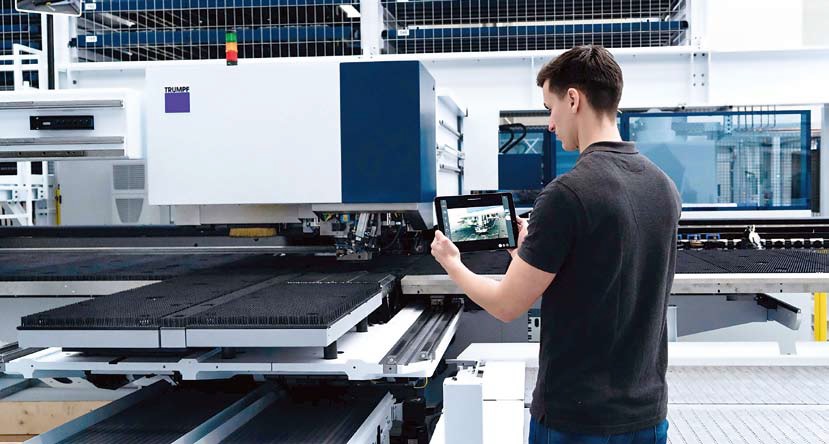By: Daniel Schauber

How can you ensure that production remains up and running despite shortages of skilled workers? Fortunately, a whole range of possible solutions is available. Innovative training is a key tool for combatting the shortage of skilled workers. But novel technical solutions, such as fully automated production machines or remote maintenance can also help.
The books are brim full, yet there are too few qualified staff to process the orders in time. This is a problem which all too many companies in the manufacturing industry are familiar with. When skilled employees are working at their limits, it is important for companies to be able to access external resources in order to keep production up and running. This is especially true when there are not enough experts who are able to repair broken machines. This is where remote maintenance can close the gap.
Remote support raises efficiency levels
Being able to respond quickly to potential disruptions remotely in cases of unforeseen machine breakdowns is now possible today.
Trumpf SE + Co. KG, a machine tool manufacturer based in Ditzingen, Germany, also relies on remote maintenance to keep its customers' machines up and running, even in times of skills shortages. "Trumpf Remote Support allows Trumpf experts to connect to customers’ machines and find the cause, or remotely guide them through fixing the problem themselves via Visual Assistance," explains Alexander Kunz, Head of the Smart Factory unit at Trumpf. This makes many service technician call-outs superfluous, he says. And this in turn allows the machine operators to resume their work more quickly.
Automation can compensate for skills shortages
Companies can also counter the shortage of skilled workers by making greater use of automation. Digital networking and automation are key ways in which companies can compensate at least in part for skills shortages. "Non-productive time, which includes activities such as searching for dockets or fetching trolleys, accounts for around 80 percent of the throughput time of an order. Digitalisation, on the other hand, helps companies to save time and use their employees' manpower for value-adding activities," explains Trumpf manager Kunz.
Automation helps to counteract the shortage of skilled workers because it simplifies many activities and saves time. In many cases, even minor automation solutions can yield enormous increases in productivity. "In the past, automation was often purchased in order to reduce staffing levels. Today, it's purchased because the companies can't find staff,” says Kunz, summing up the situation.
Three-shift unmanned working
The machine tool manufacturer’s new Pay per Part digital business model represents a special solution for companies which have large numbers of orders on their books but are struggling with staff shortages. Trumpf offers the model for its fully automatic TruLaser Center 7030. "The machine is then operated on the customer's premises, but it actually belongs to Trumpf Bank and is remotely operated by Trumpf experts from the Neukirch site with the help of special technologies," Kunz explains. The user then pays a predefined unit price for each part produced. "This raises productivity levels by over 50 percent and the company can produce parts in unmanned three-shift operation."
Specialist staff for critical production startup
Manufacturers of production machinery, too, are taking the training of machine operators into their own hands.
Trumpf, for its part, offers training courses in all disciplines relating to sheet metal production all around the world – including everything from part design to digital production control. Last year, the laser specialist also founded its own consultancy company, Smart Factory Consulting GmbH, which supports companies in setting up networked manufacturing. "This allows productivity potential to be leveraged without the need to hire additional staff," Trumpf manager Kunz emphasises.
It is often particularly difficult for manufacturing companies which operate abroad, such as in the USA or China, to access qualified technical specialists. Can machine tool builders offer their customers special solutions to alleviate the shortage of skilled workers in key foreign markets? Large international suppliers such as Trumpf also keep resources available for this. "We support companies around the world in addressing the shortage of skilled workers," says Kunz, presenting a technical solution.
Software which frees up employee capacity
Users can deploy Trumpf's Oseon software for digital planning and control of their production, for example. "This frees up employee capacity, as they don't have to worry about things like transporting materials," says Kunz. "The use of Automatic Guided Vehicles, for instance, allows companies to automate the material handling process," he explains. In addition, the software provides production personnel with a clear overview of all relevant information on the next work step in their work environment on a tablet. "This reduces errors and helps get new employees up to speed more quickly."

 iConnectHub
iConnectHub
 Login/Register
Login/Register Supplier Login
Supplier Login



























